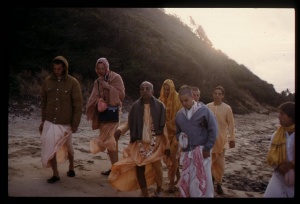CC Madhya 13.45 (1975): Difference between revisions
(Vanibot #0027: CCMirror - Mirror CC's 1996 edition to form a basis for 1975) |
(Vanibot #0020: VersionCompareLinker - added a link to the Version Compare feature) |
||
| Line 2: | Line 2: | ||
<div style="float:left">'''[[Sri Caitanya-caritamrta (1975)|Śrī Caitanya-caritāmṛta (1975)]] - [[CC Madhya (1975)|Madhya-līlā]] - [[CC Madhya 13 (1975)|Chapter 13: The Ecstatic Dancing of the Lord at Ratha-yātrā]]'''</div> | <div style="float:left">'''[[Sri Caitanya-caritamrta (1975)|Śrī Caitanya-caritāmṛta (1975)]] - [[CC Madhya (1975)|Madhya-līlā]] - [[CC Madhya 13 (1975)|Chapter 13: The Ecstatic Dancing of the Lord at Ratha-yātrā]]'''</div> | ||
<div style="float:right">[[File:Go-previous.png|link=CC Madhya 13.44 (1975)|Madhya-līlā 13.44]] '''[[CC Madhya 13.44 (1975)|Madhya-līlā 13.44]] - [[CC Madhya 13.46 (1975)|Madhya-līlā 13.46]]''' [[File:Go-next.png|link=CC Madhya 13.46 (1975)|Madhya-līlā 13.46]]</div> | <div style="float:right">[[File:Go-previous.png|link=CC Madhya 13.44 (1975)|Madhya-līlā 13.44]] '''[[CC Madhya 13.44 (1975)|Madhya-līlā 13.44]] - [[CC Madhya 13.46 (1975)|Madhya-līlā 13.46]]''' [[File:Go-next.png|link=CC Madhya 13.46 (1975)|Madhya-līlā 13.46]]</div> | ||
{{CompareVersions|CC|Madhya 13.45|CC 1975|CC 1996}} | |||
{{RandomImage}} | {{RandomImage}} | ||
==== TEXT 45 ==== | ==== TEXT 45 ==== | ||
Latest revision as of 07:51, 27 January 2020
Śrī Caitanya-caritāmṛta (1975) - Madhya-līlā - Chapter 13: The Ecstatic Dancing of the Lord at Ratha-yātrā

His Divine Grace
A.C. Bhaktivedanta Swami Prabhupada
A.C. Bhaktivedanta Swami Prabhupada
TEXT 45
- śāntipurera ācāryera eka sampradāya
- acyutānanda nāce tathā, āra saba gāya
SYNONYMS
śāntipurera—of Śāntipura; ācāryera—of Advaita Ācārya; eka—one; sampradāya—group; acyutānanda—the son of Advaita Ācārya; nāce—dances; tathā—there; āra—the rest; saba—all; gāya—were singing.
TRANSLATION
There was another party that came from Śāntipura and was formed by Advaita Ācārya. Acyutānanda was the dancer, and the rest of the men were singers.